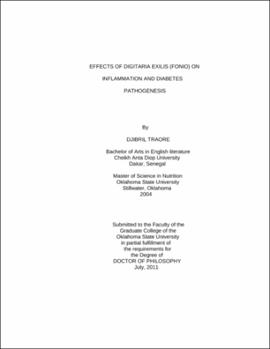| dc.contributor.advisor | Kuvibidila, Solo Ruth | |
| dc.contributor.author | Traore, Djibril | |
| dc.date.accessioned | 2013-11-26T08:26:21Z | |
| dc.date.available | 2013-11-26T08:26:21Z | |
| dc.date.issued | 2011-07 | |
| dc.identifier.uri | https://hdl.handle.net/11244/6869 | |
| dc.description.abstract | Scope and Method of Study: Digitaria exilis (fonio), a wild cereal consumed in West Africa, is rich in chromium, B-glucans and sulfur amino acids, factors known to modulate inflammation and diabetes. However the mechanisms are unknown. We hypothesized that fonio might: a. modulate diabetes pathogenesis through improvement of insulin resistance, glucose metabolism, and reduced inflammation; b. trigger the inflammatory response during infection; c. induce differentiation of immune cells to modulate overall immunity. To test our hypothesis, 3 studies were conducted: In sudy 1, 4-week old KK/HIJ transgenic male mice were fed either the AIN 93 diet or the same diet fortified with 30% fonio or rice flours (n=20). Ten mice per dietary treatment group were sacrificed after 3 or 4 months of feeding. Glucose and insulin tolerance tests (GTT & ITT) were studied by standard techniques. In study 2, non diabetic healthy mice CD1 mice were challenged with bacterial lipopolisaccharides (LPS) and treated with fonio extracts and were sacrified two hours later. To assess the effects of fonio extracts on in vitro secretion by immune cells, spleen cell suspensions (2 x 106/ml) were activated with 2.5 ug/ml LPS for 48 h (study 1 and 2). In study 3, we investigated the mechanisms by which fonio extracts modulate cytokines secretion. For that purpose, monocytic THP1 cells were incubated without and with different concentrations of fonio extracts for 24-72 h. Cell proliferation, viability and differentiation were assessed by trypan blue exclusion test, nitroblue tetrazolium salt reduction, and microscopy, respectively. Cytokines in plasma and spleen cell supernants from the 3 studies were measured by enzyme immune-absorbent. | |
| dc.description.abstract | Findings and Conclusions: (1) fonio improved insulin resistance and reduced low-grade inflammatory cytokines in KK/HIJ mice. (2) Fonio extracts significantly up-regulated the secretion of TNF-½ (pro-inflammatory), and IL-6 (immune modulatory-pro-inflammatory) secretion in vivo and in vitro in LPS-treated mice. (3) Fonio extracts reduced monocytic THP1 cell growth via differentiation, and not necrosis. This is the first study showing that fonio can modulate the secretion of inflammatory cytokines in transgenic and non-diabetic mice. The current data will allow us to conduct a translational human study. | |
| dc.format | application/pdf | |
| dc.language | en_US | |
| dc.rights | Copyright is held by the author who has granted the Oklahoma State University Library the non-exclusive right to share this material in its institutional repository. Contact Digital Library Services at lib-dls@okstate.edu or 405-744-9161 for the permission policy on the use, reproduction or distribution of this material. | |
| dc.title | Effects of Digitaria exilis (Fonio) on inflammation and diabetes pathogenesis | |
| dc.contributor.committeeMember | Stoecker, Barbara J. | |
| dc.contributor.committeeMember | Lucas, Edralin A. | |
| dc.contributor.committeeMember | Maness, Niels O. | |
| osu.filename | Traore_okstate_0664D_11679.pdf | |
| osu.accesstype | Open Access | |
| dc.type.genre | Dissertation | |
| dc.type.material | Text | |
| dc.subject.keywords | cytokines | |
| dc.subject.keywords | diabetes | |
| dc.subject.keywords | fonio | |
| dc.subject.keywords | inflammation | |
| dc.subject.keywords | insulin | |
| dc.subject.keywords | kk/hij mice | |
| thesis.degree.discipline | Nutritional Sciences | |
| thesis.degree.grantor | Oklahoma State University | |
